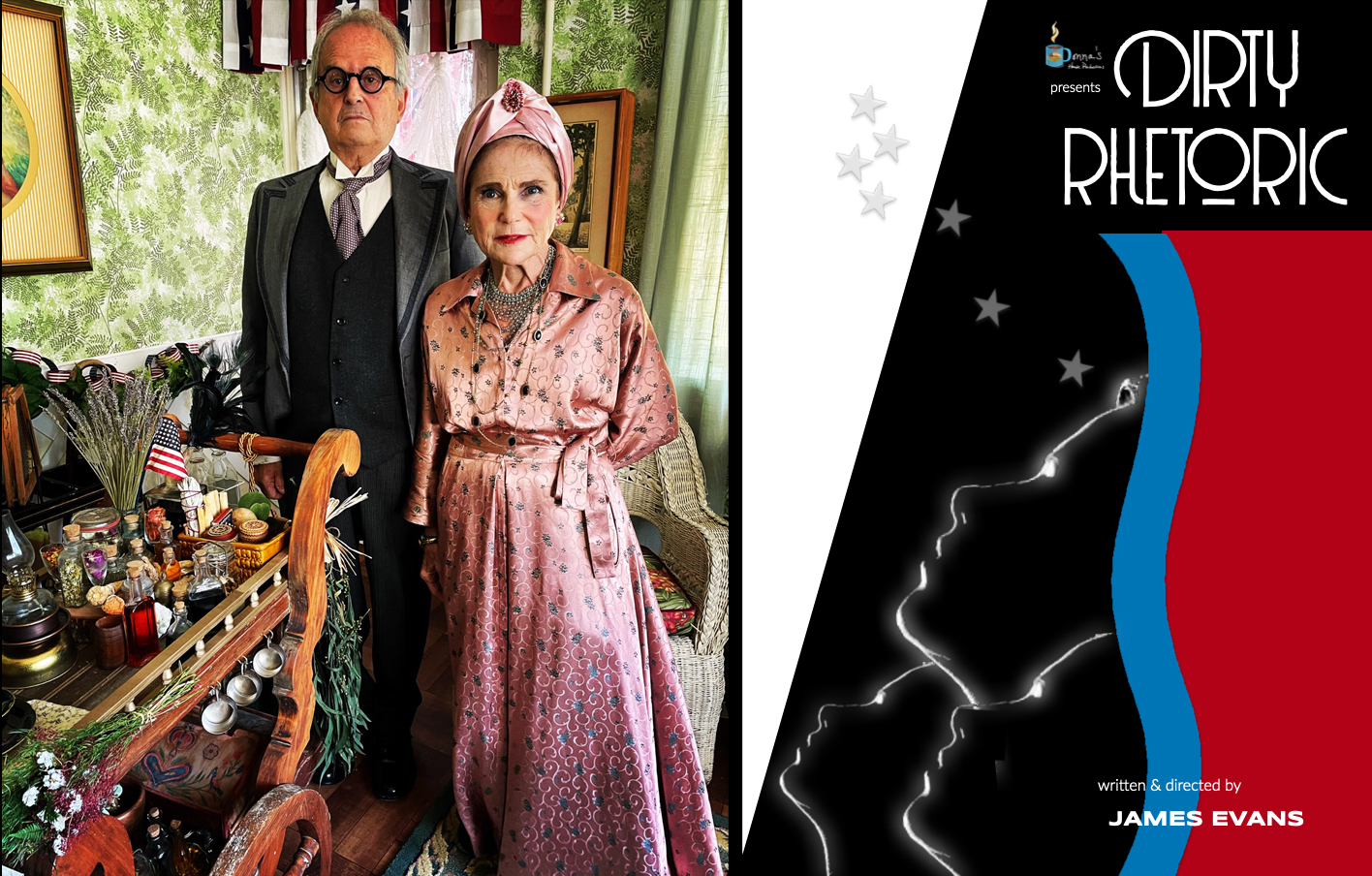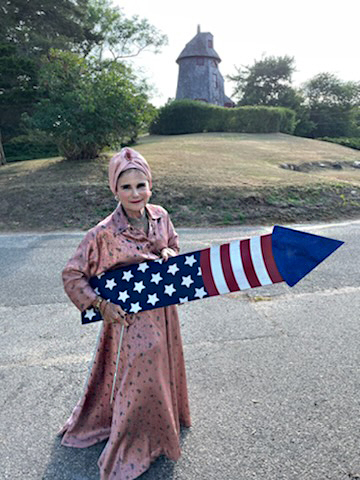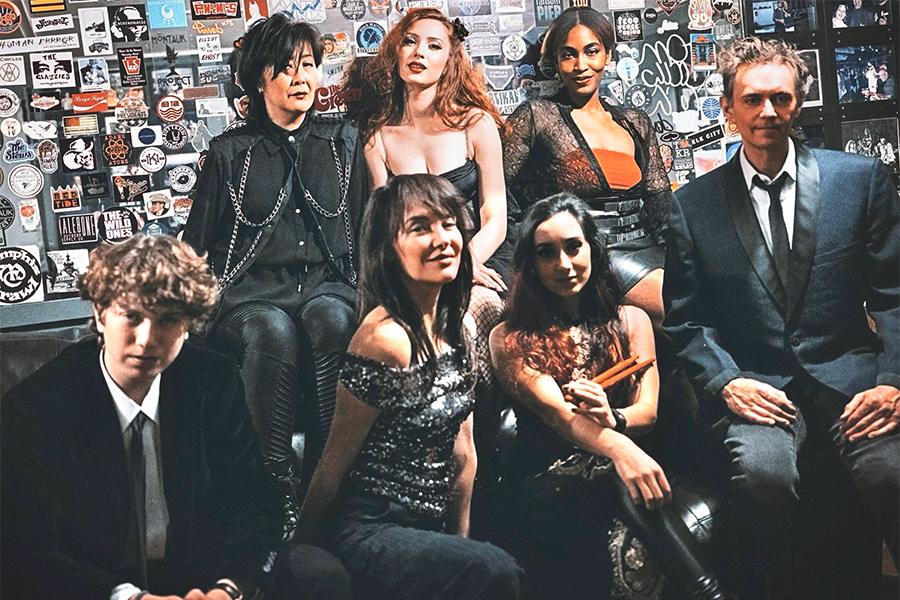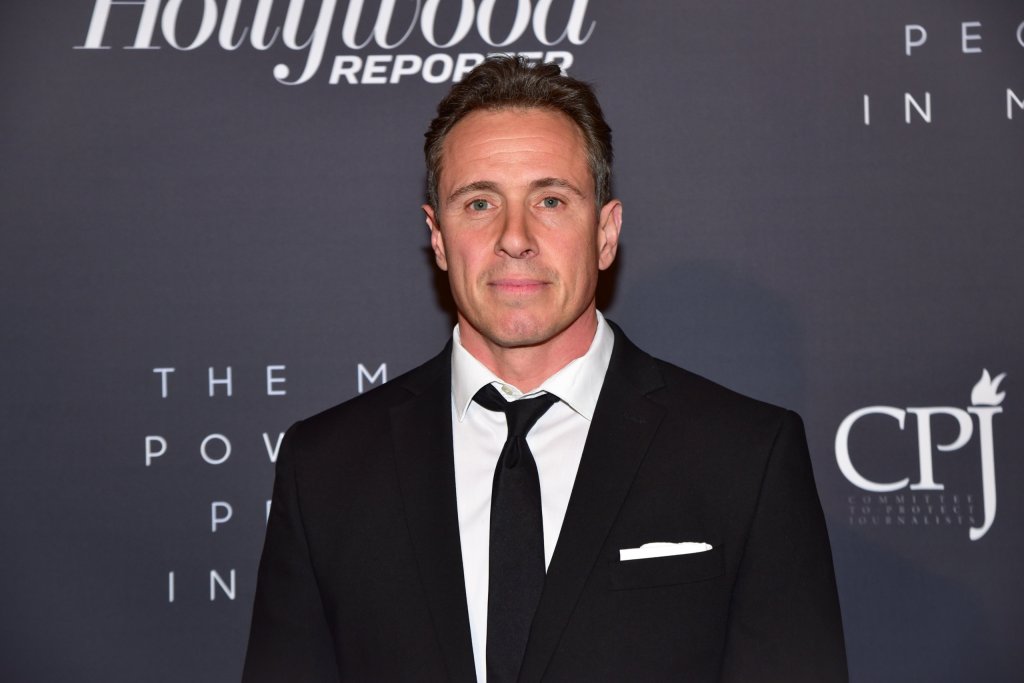On the Set of 'Dirty Rhetoric' with Tovah Feldshuh

Dan’s Papers was given the opportunity to interview Broadway, TV and film star Tovah Feldshuh on the Southampton set of her upcoming independent film, Dirty Rhetoric.
The film, written and directed by Mastic Beach filmmaker James Evans, casts Feldshuh (as Beatrice), Tibor Feldman (Max), Amy Gaipa (Ruth), James Sharpe (Bobbi), Raena White (Earla), Julie Halston (Elizabeth) and Daniel K. Isaac (Akira) as seven strangers looking to settle scores on the night of Fourth of July in the early 1950s.
As mysterious flashes light up the sky, they fear the end of the world may be coming. Dirty Rhetoric is set to open with a booming jazz standard as a choreographed Art Deco animation sets the scene.
The story is then split into three sections: Betrayal of Bea, Rhapsody of Ruth and Erudition of Elizabeth.
Feldshuh enlightened us to further details pertaining to the film and her contributions to it.

Tovah Feldshuh Discusses Dirty Rhetoric
How did you become aware of the Dirty Rhetoric production and what first got you excited to join the project?
I became aware of it through my manager and agents — through my team — and they made me the offer. I then read the script.
As I wrote to the director (James Evans) today … “I’ve always been an adventure traveler, and this is what attracted me to your script. You adventure to the corners of the mind and of logic, beyond linear time and common dimension. You gave me a character who lives like Beatrice did for Dante on the astral plane.”
So that is true, in terms of feet on the ground, I have had the pleasure and the longevity so far to visit about 95 countries. I don’t count the countries, but my children, who are math geniuses, made me count the countries. So all this stopped with COVID. I was on my way to Ethiopia when COVID broke out, and I obviously never got on the plane.
That is what excited me about the piece. Basically, through the flights of James’ imagination, and he may not claim thus … (this script is) like when you go see a play and you don’t know the actor on the stage, but there are certain actors where they’re just jaw-droppingly brilliant. That’s the greatest compliment to the artist, that the piece itself works on its own.
So this piece worked on its own for me regarding the character, because the character (Beatrice) is pretty … wacky. If you want to do the research, she’s suffering from lung cancer. … I’m not saying she’s done … but the difference between you and me and somebody who’s really sick is they know how they’re going to die, and you and I don’t know how we’re going to die. … The irony is that I don’t die from cancer …
But he (Evans) had wild flights of fancy and imagination between seven highly eccentric people, and sometimes it doesn’t all coordinate according to straight, linear, logical thinking. It makes quantum jumps in time and in logic. So the actor has to thread that for himself, and you thread it and create a seamless relationship between the actor and the character by trying to experience the character’s experiences inside your body.
You take somebody else’s experience, like I would take your experience at your age without COVID or Vicki (Schneps)’s experience with that hair and the glamor and the sense of owning a space, and put it inside my flesh and blood and try to transform myself in the time I’m playing Vicki Schneps — (transforming) into her truly, not indicating it, not make-believe, not doing a two-dimensional cartoon.
So the reason I took this piece is because it was a very interesting, wacko character. And the way James wrote, he gives us a lot of space to build our own backstory, so I built my own backstory, some of which is never mentioned, but I needed it to anchor me. Why does she run away to a farm? Is it a farm? Is it a compound? Is it a cult?
He leaves those questions open in his writing. How do we exactly die? It’s not clear, but we go to black. And how do I feel about death? Well, if I’m in the fourth or fifth dimension, if I believe in reincarnation, maybe meeting my demise is very different than going into mourning.
It may be going into an ascension of flight, similar to the Hindu or Buddhist ideology. I don’t think she deals with Christianity, except from her youth and churchgoing and debutante balls, but basically, she’s gone into another plane.
That’s how I got the offer. I saw the part, I saw the size of the part — it’s very big— and I took it because I knew it would make me strong. And it has.
That’s the glory and the challenge of independent filmmaking. You often have one person per department.
On bigger films or even any kind of studio television or cable television, you have a costumer on the set to watch out for steaming and pressing, and you have a costumer back in the truck planning the next day, getting everything ready, restoring other costumes, doing the laundry.
You don’t have that here. You have one costumer, which is Kivlan (King), one person heading props, which is Audrey (Wick), one director, one camera, which means things go, not slowly, but when there’s more revenue you have two cameras or three cameras. …
So people are asked to extend themselves where the ordinary is made extraordinary. They’re asked to extend themselves beyond what is normally asked of the crew and the cast. And we do. … We have night shoots. We don’t have a situation where we can rent a tent, where it can always be day for night, where we meet at 10 a.m. and shoot it as if it’s night.
With this budget, you have to meet at 5 at night and you shoot until 5 in the morning. It’s like prom night. I haven’t stayed up this late since I went to Scarsdale High School and went to the prom.
Certain people have just been astonishing. One of them is Amy Gaipa, because she is not only a fine actress — and she is a fine actress — she’s an unbelievable art director, she did the sets and she’s producing the movie. I mean, what?
So before the take, she’ll adjust a fedora, adjust an angle, make sure an ancient ironing board is in the bunker, and then she’ll act. And she is skilled. She’s really skilled.
Also, I don’t know what her budget is, but look at what she put together. I mean, this set is magnificent for a modest-budget indie.
The other reason I took the film is because I’m in the third glorious act of my life. My mother lived to over 103, so I hope I have four acts like she does. And it’s not just the cliché of giving back, I think you need to give young artists a chance, and I want to be in touch with young artists. …
Emily Laue: incredible first AD (assistant director) who keeps her feet on the ground. Mark Badolato: the second AD … (the food service provided is) really a conscious gift, well done. The director of photography is from Spain — I happen to be fluent in Spanish —his name is Guillermo Cameo, and this is exquisite.
This is exquisitely shot. His sensibility is magnificent. The composer is amazing. His name is Gautier Abadie … he is something special. He is from Toulouse, and I get to speak to him in French. It’s a very international set.
For instance, in one of the scenes early on, I broke into French for no known reason, broke in. And then it comes up to me, of course I’ve read the script a few times, that my sister Elizabeth is writing a book specializing in revolutions, particularly the French Revolution.
So then there’s this whole sub thread of us being sisters and educated in France or being pro-French or Francophiles. And he let it in. That’s James. He has, like many great directors, what I call the open hand.
He opens his hand for other people to contribute at their best, and that makes it fun. That makes you feel that you have some meaning in the process, some contribution. And like everything else, whether it’s a little baby or a person at the end of their life, everybody wants to be heard.
And so these people that show up, whether it’s Amy Gaipa or James Sharpe — another producer who is a wonderful actor, just a wonderful actor and has a great relationship with James Evans.
James Evans can tell James Sharpe to stand on his head and he can do it and make us believe it. So he’s very, very good. These are not accidents. These come from the head of the fish. And the head of this fish is James Evans.
Would you say it’s been easier to develop better cast/crew chemistry and synergy with a small group as compared to your larger productions?
I think the synergy of a group often depends on experience, and let me just say this: Everybody is gifted here, but many are young, so it’s a different kind of sensibility.
We are not yet in the corporate business of making films. And when we are in the corporate business, there will have to be a lot of adjustments that will be made in a bigger space. There’ll be more help, but there’ll be much less tolerance.
So is it easier? It’s easier when you have a ton of money and you have two cameras, and you can shoot day for night. That’s when it’s easier. Those are not the perks of this job, but there are other artistic perks that are overwhelmingly great.
And considering who is helping us, I think we’re doing remarkably well. And the heads of departments, like Guillermo, our director of photography. And the gaffer and key grip are terrific, Vincente Roxas and Jhony Cubides. … Everybody tries their best, and I try my best. …
I’ve enjoyed this. I have enjoyed being used to my fullest capacity as an artist. I have enjoyed that. It’s made me strong. And when I get to bigger budget projects where there’s an incredible amount of staff and people checking you, et cetera.
For example, we have one fabulous makeup man, Alan (Rowe Kelly). He is making everybody up and checking everybody.
Normally, he’s the head makeup man in the makeup trailer, and there’s somebody on set … but there are certain time constraints that get sacrificed, because — it’s not that we’re understaffed — we’re staffed the way an indie is staffed.
And what’s phenomenal is that James is getting this done at all, at this level, and in his hometown in the Hamptons. And he’s supplied jobs and money for people local, myself even included. I mean, I live in Quogue. I’m a Hamptonite, a loving one.
Is this your first time filming a movie in the Hamptons?
Yes, absolutely my first time. And I’ve played Bay Street with Becoming Dr. Ruth, and Tovah: Out of Her Mind I did for Sybil Burton. I did Tallulah Hallelujah! playing Tallulah Bankhead for Sybil Burton.
I did The Prompter for Scott (Schwartz, artistic director of Bay Street Theater) and Dr. Ruth for Scott, and I did a concert that was so sold-out, they had to add chairs. I was so happy do that for one of the (Music Mondays). I’m very affiliated with that theater.
I love Tracy Mitchell (Bay Street executive director) and Scott deeply. Scott Schwartz and his dad (Stephen Schwartz, composer of Pippin and Wicked) — I sang for his dad (Stephen Schwartz) in 1974 and then did Pippin.
I also love Guild Hall. … I’ve also worked the Westhampton Beach Performing Arts Center.
Going back to the freedom that James gives you with your character, their backstory and their fate, were there any specific character traits or flaws you chose to emphasize in your performance?
Yeah, she’s a shut-in, and she has this very complicated relationship with Max, who’s her butler and was her lover. James thinks they’re married; I don’t think they’re married — we don’t wear rings. … That’s what I mean.
Normally, if you have a director where it has to be this way and they go back to the artist, you kind of have a mess because the artist has to be credible. That’s the most important thing, we have to believe him.
James has extracted some of his script from other inspirations, whether it’s Sunset Blvd. — which, I mean, I wear a turban and I dressed meticulously, but I’m shut-in, and I open my house once a year for the Fourth of July party, which I celebrated with my daddy.
It’s all about independence. And what does independence mean when you start to excavate it? Well, it means, also for me, independence of the spirit. Reincarnation, I say, reincarnation. … I go right to the concept of reincarnation, and the audience has to catch up.
So he endows the audience with a very high IQ. A very high IQ.
Beatrice’s sister Elizabeth has a very different history and character from Bea. Do you feel you had to find some semblance of sameness, something you have in common, to be able to connect with her character?
Yes, well, we have the French thing, and then you just use the Julie Halston thing, because Julie Halston is an extremely personable human being. She is sociable, she loves to be with people.
She has an extraordinary amount of friends in our business because she keeps in touch with people. She’s a woman of great grace, kindness and humor. So that was easy.
As for the other actors, Tibor Feldman has played my husband once before in another indie movie, Amy Gaipa I spoke about — great producer, art director, actress. James Sharpe is excellent as Bobbi, and he’s also a producer. … Raena White as Earla, she’s beautiful and about to go on Broadway in Some Like It Hot.
… And then the great Daniel K. Isaac, who is just the most adorable, who’s one of the stars of Billions and has a play that’s opening at La MaMa and he is going on Broadway with Linda Lavin. …
Michelle Christensen: The costumes are unbelievable, and they’re brought in from Michigan, so go figure. …
What do you think audiences will find most engaging about the script and the finished film?
I think this will be an art cinema classic. … This is a film that explores the foibles of human nature and the eccentricities of human beings that … go beyond natural considerations.
It’s incredibly eccentric, and as thus, it’s very important that the actors, as they interact, really connect. They really have to connect.
The film is eccentric enough that you better make sure that at least you’re connecting with the other human being and having your own logic. … So that’s what the film does.
It explores the extraordinary eccentricities of human behavior under pressure with everybody having different needs.
There’s a quote from The Tempest, which I will leave you with:
“We are such stuff as dreams are made on, and our little life is rounded with a sleep.” And that has a lot to do with what this movie is about. And it’s been a great pleasure doing it. It’s been a great adventure and a real lesson of how to roll with the punches …
To keep up with Dirty Rhetoric and its TBD release date, visit jamesevansfilms.com.



